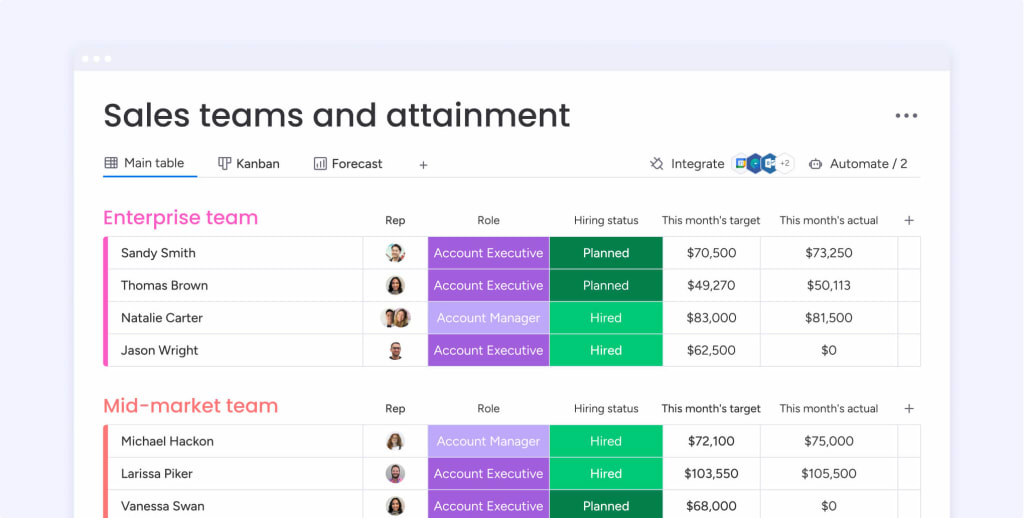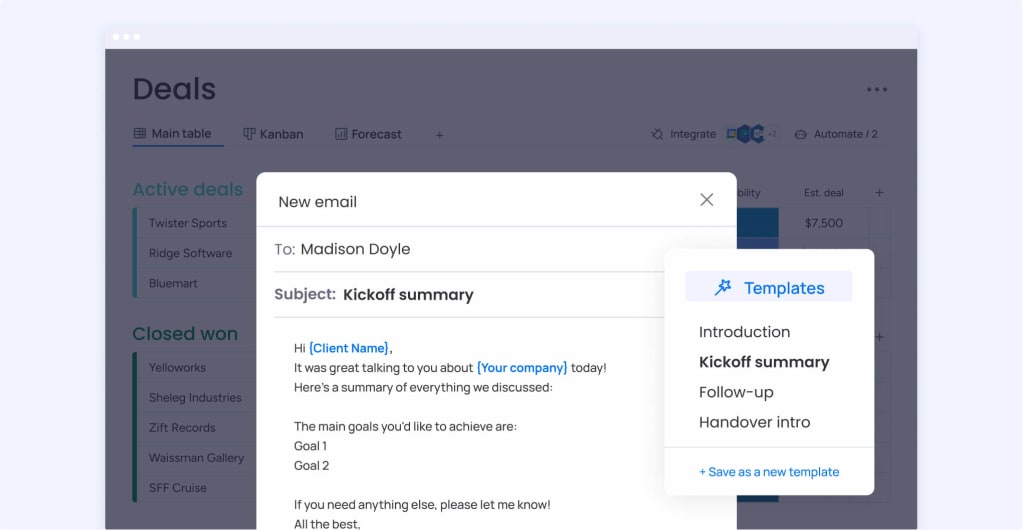Sales management is essential for any company that wants to grow its revenue and increase its profitability. It helps managers create plans, set quotas, and motivate staff. Plus, it empowers your sales force by giving them the processes and support they need to achieve their targets.
In this guide, we’ll define sales management, highlight its importance to your business, and break down the day-to-day responsibilities of a sales manager to make your sales management process as effective as possible.
What is sales management?
Sales management entails leading and directing a sales team to achieve sales objectives. It helps sales managers with activities such as hiring, training, and motivating sales staff, coordinating sales operations, implementing sales strategies, analyzing sales performance, and overseeing the entire sales cycle.
Effective sales management requires a thorough understanding of the sales process and the use of sales management software to optimize selling approaches and enhance the team’s competencies.
Why is effective sales management important?
Effective sales management is crucial for achieving sales targets, reducing costs, motivating the sales team, and aligning sales activities with business objectives.
- Achieving sales targets: Sales management helps teams accomplish sales objectives, control sales processes, and close deals faster, boosting sales performance and enabling companies to thrive in a competitive market.
- Reducing costs and maximizing profits: Effective sales management allows businesses to optimize lead qualification and improve team communication, reducing costs and increasing profits.
- Motivating the sales team: A successful sales manager knows how to hire the best people, improve their skills, and help them work effectively, ultimately leading to increased sales and profitability. [Use our sales training template for onboarding your sales team.]
- Improving forecasting and reporting: Sales management software enhances sales forecasting accuracy, reduces variances in revenue reporting, and provides insights into team performance.
- Aligning sales and company objectives: Effective sales management aligns sales activities with business objectives, enhances collaboration with other departments, maximizes sales team productivity, improves customer satisfaction, identifies growth opportunities, and drives revenue growth.
What are the different types of sales management?
There are several types of sales management, each with its own focus, expertise, and responsibilities. Some of the common types include:
- B2B sales management: Focuses on selling products or services to other companies (business to business) and typically involves building long-term relationships with clients due to more significant deals.
- B2C sales management: Focuses on providing goods or services to individual customers (business to consumer) and often relies on advertising and marketing through online channels like social media.
- Enterprise sales management: Involves selling large-scale, high-value products or services to large organizations, often through a lengthy and more complex sales process with multiple decision-makers.
- SaaS sales management: Involves selling online software or apps on a subscription basis to businesses and customers, with deals often closed via remote sales processes.
- Direct sales management: Involves individuals and small businesses selling directly to consumers (DTC) and typically relies on one-on-one interactions.
Furthermore, different situations and industries require various sales management styles.
What are the different sales management styles?
There are four fundamental sales management styles.
- Directing: A one-way communication style, where the manager tells the salesperson what to do in an autocratic manner.
- Selling: A persuasive communication style, where the manager sells ideas and strategies to the sales team.
- Participating: A two-way communication style where the manager encourages the sales team to contribute ideas and participate in decision-making.
- Delegating: A hands-off style where the manager empowers salespeople to make decisions.
What are the key aspects of sales management?
Sales management has four key aspects: people, process, goals, and strategy.
1. People
Sales management involves developing and leading the sales team. It includes recruiting, training, and supervising sales staff to ensure they have the necessary skills and knowledge. A sales manager is also responsible for motivating the team and providing the resources required for their success.
2. Process
Developing and executing a sales plan is an essential part of sales management. It includes setting up a process for closing deals, measuring success, and equipping the sales team with the tools, technology, and support to carry out their roles successfully. It also involves analyzing sales data, designing strategies, and managing resources and budgets to ensure the sales team meets its targets.
3. Goals
Setting clear objectives and sales targets is fundamental to sales management. Sales managers are responsible for establishing sales quotas, monitoring sales performance, and ensuring that the team is on track to achieve its goals. Clear goal and quota communication is essential to ensure that each team member knows exactly what is expected of them.
4. Strategy
Sales management requires the development of a clear sales strategy. It involves planning and managing sales activities and setting up a sales process for every sales cycle stage. A well-defined strategy is essential to ensure that sales efforts are fruitful and aligned with the overall business objectives.
To summarize, effective sales management encompasses building and leading the sales team, implementing a well-defined sales process, setting clear sales objectives, and developing a cohesive sales strategy to drive revenue growth that ensures the success of the sales team and the company.
What are the day-to-day responsibilities of a sales manager?
Sales management sounds like it has many benefits, but what does it actually look like day-to-day?
You’ll spend a lot of time coaching and training your sales staff and an equal amount of time hopping onto calls to help smooth over sales objections. Companies that foster a growth mindset and embrace the digital transformation of professional coaching, significantly increase their performance and are more profitable.
Here’s what the day-to-day responsibilities of a sales manager typically include.
1. Individual coaching and team training
Arguably the number one thing sales managers are responsible for is ensuring sales staff have the knowledge, tools, and support they need to do their jobs. Ultimately, that means mentoring, coaching, and providing ongoing training, so they’re prepared to combat common objections to the sales process and feel confident talking about the product, competitors, and the market as a whole.
High-performing sales teams that pay close attention to training see 9% faster revenue growth.
Each individual is different, so the job also requires some one-on-one attention. That means shadowing calls, reading emails, and getting a good sense of their strengths and weaknesses.
Sales managers can use tools, like monday CRM, to get real-time insights. The reports and dashboards can help highlight whether activity levels are high enough or whether sales team members need help closing deals.
2. Passing updates to senior leaders and executives
A big part of the sales leader’s responsibilities includes passing information up the chain of command, so senior leaders and executives have an accurate picture of essential things like team morale, sales forecasting, operations bottlenecks, and market challenges.
Some of that will require more of a personal touch, but sales managers can automate most of it. With monday CRM, you can set up sales automation to streamline internal communication, manually change a lead’s status, or send reports based on specific events.
3. Shifting priorities and executing new tactics
A significant part of sales management involves disseminating information from the top down. Sales leaders constantly review data, analyze the market, and tweak the organization’s strategic goals. It’s then up to sales managers to simplify, communicate, and execute those plans.
With the insights gained from analyzing sales metrics, speaking with senior leaders, and coaching individual salespeople, the sales manager can adjust the organization’s sales strategy.
For instance, if the cold email campaign is falling flat and the goal is to get more people to respond to LinkedIn messaging, the sales manager may call a meeting and ask the team to shift their efforts accordingly. Or, if the team’s struggling to hit this month’s sales target, the sales manager might run a contest that provides an incentive like a cash award or prize to the sales rep with the highest outbound calls or the largest deal closed.
4. Ongoing performance analysis and reporting
ales managers must analyze sales data to make informed decisions and track the team’s performance. They need to compare pipeline performance and progress against their sales forecast and goals. And they need to know each sales rep’s performance to find ways to improve and get closer to meeting sales objectives.
Using the reporting and sales dashboards in monday CRM, managers can quickly access the insights they need.
Although forecasting sales and tracking revenue are great metrics, sales managers must determine which tactics are effective, which salespeople are performing, and whether the sales team is on track to meet its goals. In short, sales managers have to collect as much data as possible to draw insights and make better decisions.
5. Maintaining the sales pipeline
Another essential responsibility for sales managers is ensuring each lead in the sales pipeline is accurate and current. That includes removing stale leads to improve the sales forecast. Setting up your CRM and telling the team what to do is not enough. Sales managers must actively update their pipeline as market conditions change or customer preferences sway.
All the analysis, reporting, and training only count for something if you have accurate sales funnel data. The tighter you keep the data in your CRM, the better you’ll be able to draw insights, send correct reports, and hold your team accountable.
How sales managers use monday CRM to drive successful outcomes
A successful sales manager will track all sorts of B2C and B2B sales metrics, from sales closing ratios and sales growth to customer acquisition costs and churn rate. They’ll dig deep into sales activity numbers to see who makes the most outbound calls and emails, gets the most appointments, and provides the most demos.
Analyze sales performance
With monday CRM, you can manage your sales effectively, view multiple KPIs, reports, and dashboards in real-time, and make on-the-spot decisions that improve your team’s performance. If sales volume dips, you’ll have a clear line of sight regarding which salespeople are struggling.
Luca Pope, who leads sales and marketing for Black Mountain, says the dashboards in monday CRM allow stakeholders to visualize and export the exact data they need.
“The amount of time we save by being able to easily obtain the right lists for marketing activities or cross-selling opportunities for the Sales team is so valuable.”
Manage leads and clients
With monday CRM, you also have a centralized hub that makes it easy to get an update on a lead’s status, find out how a demo call went, or provide senior leadership with a status update.
Automate workflows
Using monday CRM gives you an edge since it automates time-consuming administrative tasks, integrates with the rest of your tools, and makes it easy to visualize your data.
For example, Black Mountain uses automated workflows to move lead information to the appropriate board in the sales cycle. If a deal status changes from ‘opportunity’ to ‘won,’ all relevant details automatically move into the client onboarding and invoicing boards. Then, automations assign the right stakeholders to manage each customer account.
Overall, using monday CRM, Black Mountain has:
- Saved over 100 manual actions
- Reduced sales admin by over 10 hours per month
- Increased conversions by 15%
Using the right software could lead your sales team to greater success, too. With monday CRM, you’ll get an accurate sales forecasting software, in-depth sales analysis reporting, and insights that make sales management straightforward. What more could you ask for?






